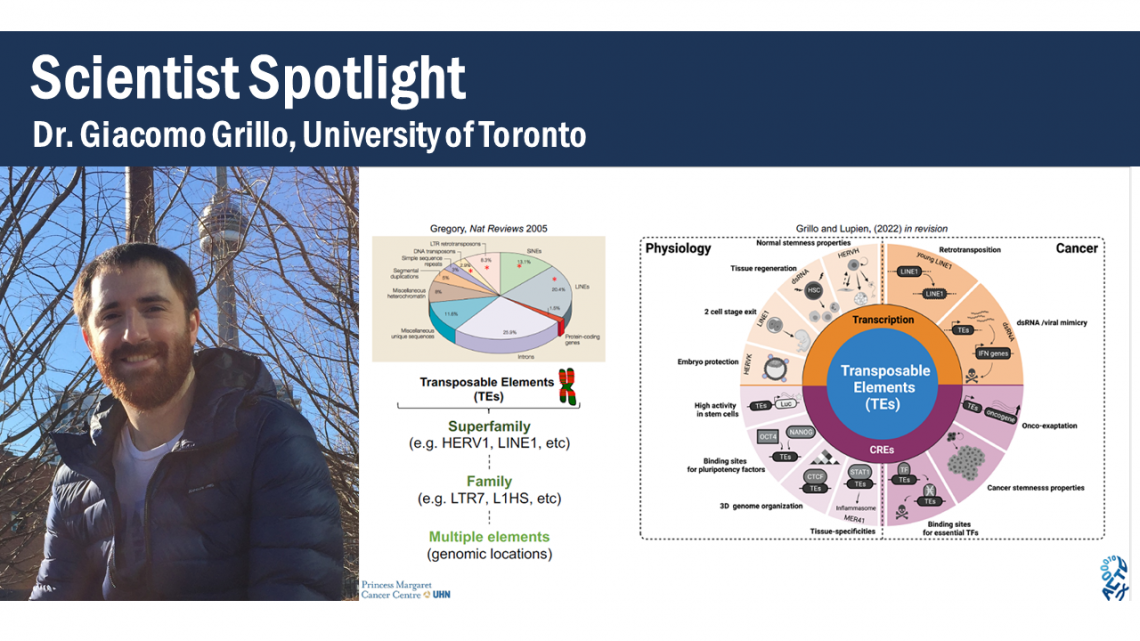Dr. Giacomo Grillo is a post doctoral fellow in Dr. Mathieu Lupien's lab at the University of Toronto. He completed his undergraduate studies in Milan at the University of Milano-Bicocca. During his PhD, Giacomo participated in the identification of new emergent players in the process of DNA methylation, studying the ICF syndrome (Immunodeficiency, Centromeric instability and Facial anomalies), a rare genetic disease affecting around 70 patients worldwide. After earning his PhD, he decided to dive deeper into the roles of the repetitive genome in physiology and cancer. In his current research, he's using observations from physiology to identify and dissect cancer properties and vulnerabilities. Learn more about Giacomo.
Can you tell us more about your research?
The vast majority of the human genome is composed of transposable elements (TE) which are elements that are or have been able to jump from one genomic location to another through different mechanisms. TEs are powerful cis-regulatory elements in stem cells where they act as biding sites for pluripotency factors and CTCF. Despite most TEs being generally repressed at the chromatin level, selected TEs are maintained active and drive tissue-specific expression programs acting as binding sites for tissue-specific transcription factors. In cancer TEs are re-activated and most studies focused on their aberrant transcription and on the role of transcripts arising from TEs. By studying physiological systems we can learn how TEs are programmed, providing new weapons to investigate prostate cancer features. These new weapons are enabling me to identify prostate cancer patients with a more pronounced dependency on Androgen Receptor (one of the key drivers of prostate cancer) and uncover novel vulnerabilities with therapeutic value.
Where are you from? What do you miss about your hometown/country?
I grew up in Milan, Italy. It may sound obvious, but I heavily miss Italian food/products and my family.
What city do you currently live in and what do you like most about this city?
I am currently in Toronto (Ontario). I love the fact that is a very multicultural city. Here different identities are really respected and embraced, trying to learn from one another.
What are some ways you detach from work/science/academia?
I have a 2-year-old son who keeps me and my wife very busy and happy. Playing with him and cooking are my best ways to think about something else and relax.
Do you have any special talents outside of research that few people in your academic life know about?
Back in Italy, I played soccer at a high level. Before COVID, and before my son was born, we used to play together at University of Toronto soccer fields. Other than this, I love to cook and show people around me the simplicity and the great flavors of authentic Italian cuisine.
Do you have a recommendation for a book, tv show, movie or documentary?
There are two Netflix series that I particularly love. The first one is “The last dance” because it really shows the commitment and hard work to be the best, in sports but also in any other field. The second one is “Meat eater” which is about hunting and cooking. This series showcases the huge respect that hunters have for nature, shows amazing landscapes, and gives interesting cooking insights.
What made you decide to become a researcher?
I originally wanted to be a clinician, but, after missing the selection to med school in Italy, the courses of molecular biology, genetics, and biochemistry (during my second year in undergrad) played a crucial role in my decision. Working with my PhD co-supervisor confirmed my thoughts and deeply inspired and motivated me. I would not be here without him.
If you wouldn’t be a researcher, what would you like to be/think you would be?
Sometimes I think I would like to be a chef. Work with other chefs in my brigade, discover new combinations of flavors, play on tradition and modernity and learn new ways of cooking amazing food.
What sparked your interest in epigenetics?
I have not had a background in epigenetics in Italy, so the courses I followed in Paris and working with my co-supervisor triggered my interest. I have to say that the years that followed my PhD were fuel to keep the fire alive.
If you could give your “first-year-PhD-self” one advice, what would it be?
Don’t waste time and learn the computational side of research properly as soon as possible.
Where would you like to see your research/field of interest end up in the future?
I would love to see what I am working on more and more in the clinic. My dream is to have patients coming to the hospital where a biopsy is taken out not only for imaging purposes but also for chromatin profiling. I dream then a transposable-elements-based measurement to tell the patient how bad his/her tumor is, the risk of developing metastasis and what kind of therapeutic strategies may fit best his/her case.

